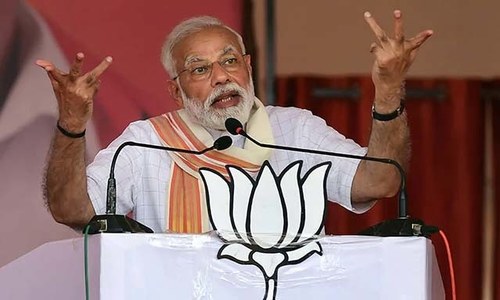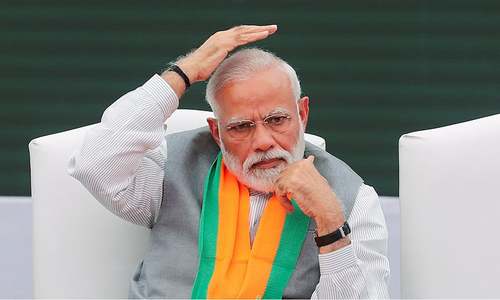The Indian government may have to make a series of major changes at the top of the nation's civil service if Prime Minister Narendra Modi is re-elected to a second term in May, according to multiple sources in the administration.
At least eight senior bureaucrats in the prime minister's office have either sought a transfer to other departments or plan to take premature retirement, three government officials said.
The officials, from the prime minister's office, the home (interior) ministry and the foreign ministry, declined to be named because of the sensitivity of the subject.
Two of them said they too are keen to be transferred to state capitals or to other jobs. They said officials in several ministries were trying to move, but did not have a number.
There are about 25 senior civil servants working in the prime minister's office, which under Modi has become the single most powerful department in government.
The three officials said the reasons for wanting out are almost all the same. Many top bureaucrats complained about two aspects of the Modi administration their inability to influence government policy as it is largely controlled and set by the prime minister and a small group of ministers and advisers, and the demanding work schedule they face.
“The sense of partnership is missing, Modi and his ministers do not have an organic relationship with the bureaucrats,” said the civil servant in the home ministry.
Sanjay Mayukh, a spokesman for Modi's ruling Bharatiya Janata Party (BJP), declined to comment on the grounds that governance issues were managed directly by ministers.
A spokesman in the prime minister's office did not return phone calls seeking comment.
To be sure, some other major governments around the world often face a series of departures and changes, especially when a first term morphs into a second term.
Also, just because an official talks about quitting doesn't mean they will.
But in India, officials in the prime minister's office are hand-picked for loyalty and tend to stay if the administration is re-elected. Modi's BJP-led alliance is tipped to win a slim majority in the April-May general election, pollsters say.
Senior bureaucrats said Modi's top-down approach, and his orders to work on public holidays, to demand they submit details of their assets, and to clean their own workplaces at the start of a five-year cleanliness campaign in 2014, has widened the gap between the civil servants and the nations leader.
Amit Shah, a close aide of Modi and the head of the BJP, in a closed door meeting attended by two ministers in February said bureaucrats continued to suffer from “communist romanticism”, a reference to the alleged influence of the left-leaning Congress opposition party on the bureaucrats. The ministers, who spoke to Reuters, declined to be identified.
Disconnect with ruling party
For some of the 5,000 or so mandarins who run the Indian government, its state-owned entities, as well as administration at state government level, Modi's style of leadership has been a jolt.
Many of these top officials have received a Western-style education at India's elite universities or schools overseas and are uncomfortable with the ruling party's right-wing Hindu nationalism and Modi's rough-hewn approach to governance.
While getting into the Indian Administrative Service (IAS), is incredibly hard only 1 out of about 4,500 who took the civil service exam got selected in 2018 traditionally once someone got in they had a job for life with few risks of ever getting fired.
An IAS job - one of the most sought after in India - bestows huge power as well as cheap housing, a car with a driver and other perks, leave for government-paid foreign study, and often the chance for plum positions in business or government consultative work after retirement.
There is also a handsome pension.
But such conditions can also breed complacency and a lack of 'can do' behaviour, according to Indian politicians and civil servants.
They say there are plenty of Sir Humphreys in New Delhi, referring to a character in the British TV comedy series “Yes Minister” about how top officials in Whitehall stall government policies they don't agree with.
In particular, there is deep resentment in the top echelons of the Indian civil service over the interference in government by the Rashtriya Swayemsevak Sangh (RSS), the Hindu right-wing umbrella group of which the BJP is a part, these officials said.
RSS functionaries have had a major role in successfully lobbying for big changes at the Reserve Bank of India, for example, leading to last December's resignation of its governor and his replacement with an official who is considered more loyal to Modi, officials said.
Technocrats, not Generalist RSS
figures also criticise Modi for not having enough professionally trained experts in place to implement some of his more controversial policies.
“The country needs a professional administration for economic development and can't depend on generalists,” said Ashwani Mahajan, co-convener of the Swadeshi Jagran Manch (SJM), the economic wing of the RSS that has campaigned against some bureaucrats.
Last year, Modi proposed bringing in at least ten professionals from the private sector into the civil service at the joint secretary level, but the plan has still to be implemented, and is facing strong resistance from civil servants.
Joint Secretaries are two rungs below full Secretaries, the top civil servant in a ministry.
A senior finance ministry official said major policy decisions including demonetisation, Modi's decision to wipe out high-denomination bank notes without warning in 2016 and to hastily launch a goods and services tax that hit millions of small businesses and jobs, were examples of political decisions that didn't get enough airing among officials before being implemented.
Both are thought to have hurt jobs growth, economists say.
There is a wider concern in the civil service about India being ruled by a Hindu nationalist party that some see destroying the country's previous tolerant and secular nature.
But the hours are as much of a concern to some.
“I am looking out for other opportunities and have even requested for a transfer because it is almost impossible to work for 12-13 hours every day, even during weekends,” said a senior official working with Modi since 2014.
















































